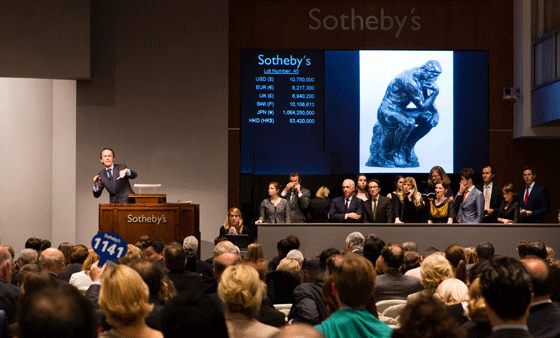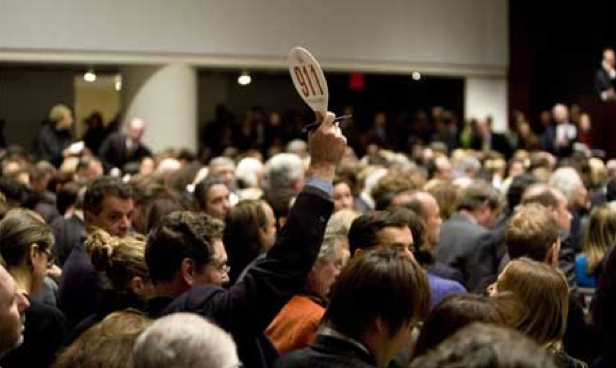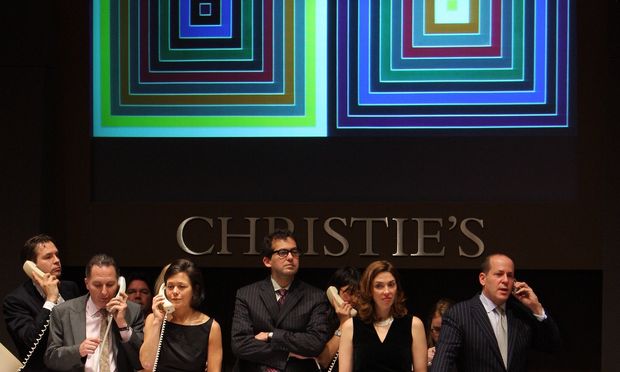Analysis
What’s It Like to Bid by Phone for Major Art Trophies at Auction? Three Bidders Tell All
It’s scary dealing with more money than you’ve ever handled in your life.

It’s scary dealing with more money than you’ve ever handled in your life.

Brian Boucher


Sotheby’s sale room, with specialists at the phone bank.
Photo via Sotheby’s.
Everybody likes to joke that if you’re attending a big auction, you should be sure not to accidentally scratch your nose, or else you’ll wind up on the hook for a $50-million Picasso.
Of course, that’s not how it works. High-level auctions are choreographed spectacles in which the auctioneer knows who’s going to bid on the priciest items, where they’re sitting, and how high they’re willing to go.
What’s more, buyers and sellers guard their privacy, and most of the multimillion-dollar bids are placed anonymously. Seeing Larry Gagosian and Eli Broad slug it out on the sales floor is a rare treat.
One of the most important tools to protect buyers’ privacy is the humble telephone. Pretty much every record-setting price you’ve read about at an auction in recent years has come in via an auction house staffer, taking a bid from the buyer—or the buyer’s dealer. At Christie’s New York’s $745-million May 2014 blockbuster, specialist Xin Li was seen talking on three phones at once (see Meet Xin Li, Christie’s Secret Weapon for China Sales).
So what is it like to place bids by phone amid a welter of global buyers vying for trophies? We asked three people who have conveyed bids for third parties. One is a New York dealer who once worked as a consultant to a major auction house. One is a former junior specialist at a major London auction house who now lives in New York and works in the art business. The third is a writer in art world circles who was tapped to bid by phone on behalf of a collector (anyone can register to bid by phone; all you need is some form of consent by the collector and approval by the auction house. In most cases, a credit card is all you need). All of them spoke with artnet News on condition of anonymity so as not to alienate the auctioneers.

At Christie’s New York November 12, 2008.
Photo © Photograph: Ramin Talaie/Getty.
The Dealer
The dealer has attended major evening sales for a decade now, and once placed a bid as high as $28 million for a work that ultimately sold for a few million more than that.
It can be nerve-wracking, she said, and recalled once bidding via phone for a client from the client’s home, on speakerphone with the auction house specialist as bidding soared. The collector’s wife got increasingly anxious while her husband pounded the table, determined to win the prize. All the while, the speakerphone prevented them from hearing the specialist any time anyone in the room was making a sound.
“And he’s hard of hearing!” she added.
She’s bid on an amount north of $10 million roughly a half-dozen times.
Asked to describe that experience, she, in turn, asked a question. “Have you ever done any theater? Yes? Do you even remember being on stage? No? That’s what it’s like. During the process, you’re laser focused, but afterwards, you feel like, ‘What just happened?’”
One remarkable aspect of it all, she said, is the layers of intermediation. The person talking on the phone with a Sotheby’s specialist who’s standing in the sale room might be a dealer who, in turn, represents a buyer.
But you’d better be sure to have the right specialist conveying your bid, she said. You don’t want someone who will be too aggressive and get out ahead of you.
The people who are most visible at the sale rooms, she said, aren’t necessarily the ones buying, but are rather there for show.
“Lots of advisors and dealers want to be seen bidding from the sales floor, so they can get listed in [the industry newsletter] the Baer Faxt,” she said. In that email newsletter, advisor Josh Baer indicates who has bought a work and, sometimes more importantly, who tried for it but missed out. Knowing who failed to bag a Picasso can be useful to dealers; those who have a Picasso might then contact the underbidder to offer a consolation prize.
“The main reason you go is to parade-wave at other people so that they know you get tickets to these sales,” she said. “It signals to other people that you have a certain level of buying and selling power.”
But, again, many don’t want to be seen.
“As for me, I do not like for people to see me bidding at an evening sale,” said the dealer. “I don’t want people to know what my clients are buying. Other art dealers can be very aggressive in trying to poach your clients.”
Experts say that boxing is more about being punched than about punching, and far more people lose bids than win them.
“I’ve lost many more than I’ve won,” she said. “It’s amazing how disappointing it can be to lose an artwork, even when you’re not emotionally invested in it.”
Sometimes, the dealer’s role, when vying for an artwork for a client, is to be the damper.
“Collectors can get really emotional. They want, they want, they want, but bidding can start to get out of control, and at some point you have to tell your client, ‘You have to stop. You’re cut off.’ I’m proud to say I’ve never paid a stupid price for anything.”
“One reason I’m good at phone bidding is that I’m restrained because it’s not my money. When I’m bidding for myself I’m far more apt to do something stupid. When bidding for a client I am the voice of reason.”
Of course, restraint can lead to regret.
“I have a client who still talks about how she should have gone one more bid on the painting she wanted—and that sale was five or six years ago. She still tells me, ‘I should have pushed harder, like you said!’”
She’s even more lyrical about one particular triumph, though, in which she obtained an Abstract Expressionist canvas for her client at a price that, she said, would now look like a steal.
“It was a gift to be able to help him buy that work,” she said. “The painting is now matched with someone who looks at it every day. It’s incredibly rewarding professionally. It was the first time I ever bid above $10 million, and it makes him deliriously happy. As a young adult, he’d gone to the artist’s studio. Then 30-plus years later he was able to get a great work by the artist. It’s perfect.”

Photo: Emmanuel Dunand/AFP/Getty Images via wnyc.org
The Writer
“You never know how fast the bids are going to go up,” said a New York writer who has placed bids twice. “It’s at the discretion of the auctioneer, depending on the pace of bids coming in. So the price might go up by more at a time than you expect. You’re not necessarily telling the bidder exactly what price they’re committing to (because the auctioneer can change the bid increment at will), but rather just saying, ‘Okay, I’ll bid again.’ Suddenly you’re spending $100,000 more than you expected with each bid. Pretty soon that gets into real money.”
The Junior Specialist
While the former junior specialist never bid on any record-setting items—that’s the purview of senior specialists and department heads—she bid on perhaps 25 items by phone over her four years. It’s a very stressful task, she said.
The highest bid she ever placed was about $80,000, for a Chinese buyer, but that didn’t secure the prize; the biggest winning bid she ever placed was about $65,000.
The house required all employees to be trained in phone bidding; because buyers come from around the globe, she was at times called on to help out in a particular auction because of her language skills, not her expertise.
Phone bidding, along with online bidding, has become such a large proportion of the business that at some auctions, there are so few people actually in the room that employees are tasked with filling seats on the sales floor to make it look as though the event is well-attended.
“When you’re going to convey phone bids for a client, you get assigned a particular client and the object they want to buy,” she said. “You don’t even necessarily know who the client is; you just know their client number. If you want to, you can use that to look them up and Google the person, but if you find it’s a major dealer, it’s just going to make you more nervous. They can be hardcore aggressive on behalf of their clients.”
“It’s better to get the actual buyer on the phone,” she said. “If it’s their assistant, you know they’re going to be really on edge because they will be stoned to death if they screw this up. I’m already acting as the middleman, and I’m nervous enough. Then you get another middleman on the other end of the line, and if they’re really nervous too, it’s a nightmare.”
You call your client perhaps 10 minutes before the desired lot comes up for sale.
“First of all, you pray that the phone connection works,” she said. “Sometimes it doesn’t, especially, for some reason, if you’re calling Russian or Chinese clients, and for them it’s the middle of the night. And you have to dial some 35-digit number to get through to them!
“Assuming you reach them, you introduce yourself, but you don’t ask their name since they don’t want even you to know,” she said. “It’s the first time you’ve heard the guy’s voice. You try not to sound nervous. First you ask them if they have a limit on what they want to spend. It’s best when they say no.”
Then starts the bidding on the item the bidder wants, and it gets complicated.
“The trick is to be ahead of the auctioneer and everyone else who is bidding,” the former specialist said. You have to know what increments the auctioneer will use in raising the price, she said, and keep the bidder apprised, while not letting the bidding outstrip what you’re telling him while you’re telling him.
“And if you want to get something several other people are bidding on, you have to scream and raise your hand to get the auctioneer’s attention,” she said.
Even competing for the relatively modest lots she bid on, she said, was bizarre.
“You work with insanely rich people for whom a bid in the tens of thousands of dollars might just be an afterthought, while your own salary is not top-notch. It’s scary dealing with more money than you’ve ever handled in your life.
“But,” she added, “all that scary stuff is also the sexy part. That’s how you get hooked.”
She sighed.
“Talking about it all makes me miss my old job.”